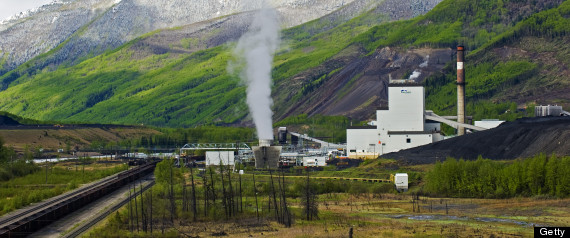EDMONTON - Health groups say the Alberta government should move more quickly to close coal-fired generating plants in response to a study suggesting they are causing respiratory problems.
"The more data that comes out worldwide on coal just strengthens our belief that coal is not just climate villain No. 1, but a huge contributor to human illness and death," Gideon Forman of the Canadian Association of Physicians for the Environment said Wednesday.
Forman's group, along with the Asthma Society of Canada and the Lung Association, are running ads this week in provincial newspapers that point to the consequences of coal-fired power plants.
The ads say emissions from such plants cause 4,800 days of missed school or work a year in Alberta because of asthma symptoms. They show a young girl using an asthma inhaler and say "Coal makes her sick."
The ads build on research released in March and done for the groups by the Pembina Institute. It attempted to calculate the health costs of coal-fired generation, of which Alberta has more than any other province.
The research used government data, health studies and a peer-reviewed modelling protocol developed by the Canadian Medical Association. It suggested that between 2008 and 2031, there will be more than 3,000 premature deaths, 2,000 hospital stays and 10,000 emergency room visits from health problems caused by coal-fired electricity.
The conclusions were immediately disputed by TransAlta Utilities.
A spokesman said a 2006 university study found no difference in the health of people living near coal-fired plants and the provincial average. Air monitoring shows contaminant levels are a small fraction of what's allowed under provincial guidelines.
The health groups aren't backing down, Forman said. Coal plants need to close.
"We can have a debate on how quickly that happens, but we think coal has to be phased out — and not along the 50-year timeline the federal government requires. We think Ontario's timeline of about 10 years is reasonable."
Forman said coal can be replaced with a combination of wind and solar power, with lower-carbon, cleaner-burning natural gas acting as a bridge fuel.
The time is right for such a move, he suggested.
"The Alberta government is probably looking for ways to present themselves as more environmentally friendly. Cutting back on coal power is one practical way that could be done."
Meetings with politicians, regulators and the groups behind the ads are to be held in the near future, Forman said.
Officials from Alberta Energy were preparing a response to the campaign Wednesday.
Original Article
Source: huffingtonpost.ca
Author: CP
"The more data that comes out worldwide on coal just strengthens our belief that coal is not just climate villain No. 1, but a huge contributor to human illness and death," Gideon Forman of the Canadian Association of Physicians for the Environment said Wednesday.
Forman's group, along with the Asthma Society of Canada and the Lung Association, are running ads this week in provincial newspapers that point to the consequences of coal-fired power plants.
The ads say emissions from such plants cause 4,800 days of missed school or work a year in Alberta because of asthma symptoms. They show a young girl using an asthma inhaler and say "Coal makes her sick."
The ads build on research released in March and done for the groups by the Pembina Institute. It attempted to calculate the health costs of coal-fired generation, of which Alberta has more than any other province.
The research used government data, health studies and a peer-reviewed modelling protocol developed by the Canadian Medical Association. It suggested that between 2008 and 2031, there will be more than 3,000 premature deaths, 2,000 hospital stays and 10,000 emergency room visits from health problems caused by coal-fired electricity.
The conclusions were immediately disputed by TransAlta Utilities.
A spokesman said a 2006 university study found no difference in the health of people living near coal-fired plants and the provincial average. Air monitoring shows contaminant levels are a small fraction of what's allowed under provincial guidelines.
The health groups aren't backing down, Forman said. Coal plants need to close.
"We can have a debate on how quickly that happens, but we think coal has to be phased out — and not along the 50-year timeline the federal government requires. We think Ontario's timeline of about 10 years is reasonable."
Forman said coal can be replaced with a combination of wind and solar power, with lower-carbon, cleaner-burning natural gas acting as a bridge fuel.
The time is right for such a move, he suggested.
"The Alberta government is probably looking for ways to present themselves as more environmentally friendly. Cutting back on coal power is one practical way that could be done."
Meetings with politicians, regulators and the groups behind the ads are to be held in the near future, Forman said.
Officials from Alberta Energy were preparing a response to the campaign Wednesday.
Original Article
Source: huffingtonpost.ca
Author: CP

No comments:
Post a Comment